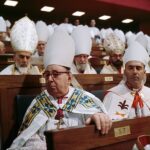Publication date: February 26, 1987
Publisher: Oxford University Press
From the publisher:
In recent years, Roman Catholic bishops and activists have been highly visible in the public debate over issues such as nuclear arms control and U.S. policy in Central America. Until now, however, the evolution of American Catholic thought on these questions has received little attention. This book is the first comprehensive critical analysis of American Catholic thought on war and peace. The author’s purpose is to evaluate the post-Vatican II transformation of the Church’s approach to war/peace issues and to point a wiser direction for its future development. The book begins with a survey of American Catholicism’s rich and sophisticated heritage of moral reasoning on war, peace, and political community. In a major reinterpretation of American Catholic history, Weigel shows how the American Bishops’ development of a theology of democracy in the nineteenth and twentieth centuries enriched the Church’s classic understanding of peace as political community. Weigel thus challenges the now-prominent idea that the U.S. Catholic bishops were not seriously involved in the war-peace debate until the last decade. A highlight of the book is its detailed intellectual portrait of John Courtney Murray, S.J., whom Weigel calls the finest political theorist ever produced by the American Church. Weigel then demonstrates how, over the past generation, American Catholic intellectuals and publicists began to abandon their heritage, and thereby impoverished the theological and political argument over war and peace, security and freedom. The book analyzes the ideas of seven key figures in the transformation of the American Catholic war/peace debate–Dorothy Day, Gordon Zahn, Thomas Merton, Daniel and Philip Berrigan, James Douglass, and J. Bryan Hehir–and critically explores the U.S. bishops’ recent involvement with nuclear and Central American policy. Recovering and developing the classic American Catholic heritage, Weigel argues, is essential to creating a wiser theology and politics whose concern for both peace and freedom challenges realists and idealists alike.




